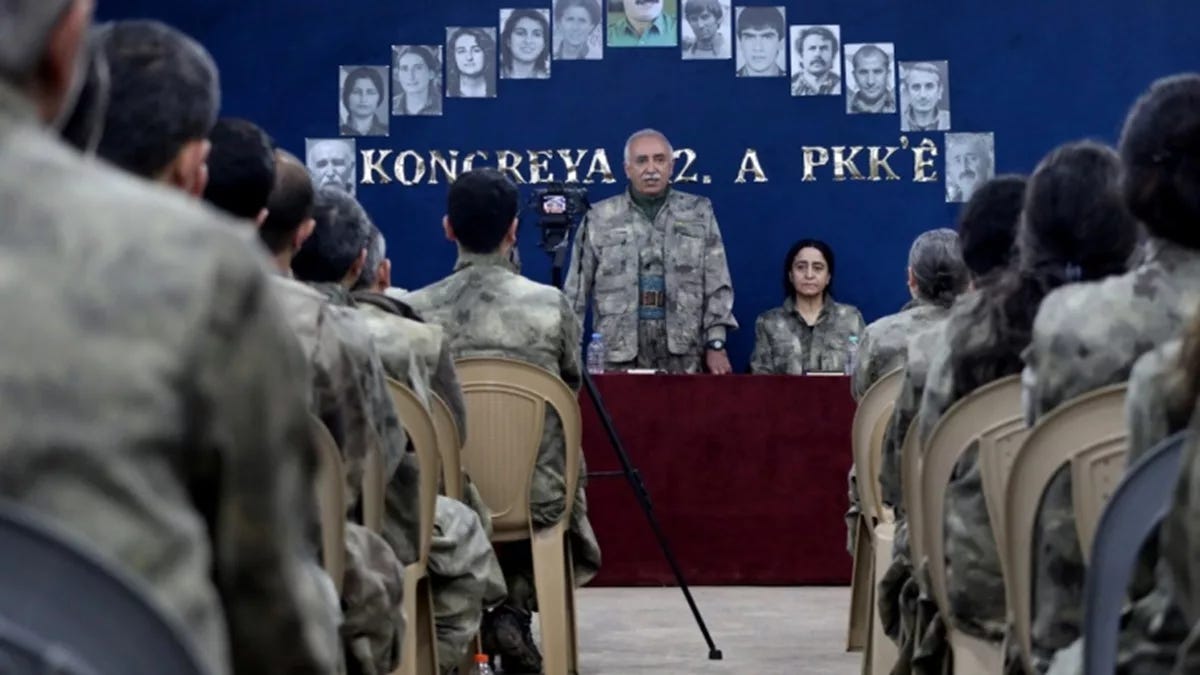In his first video statement in years, released on Wednesday, July 9, Abdullah Öcalan, the imprisoned leader of the Kurdistan Workers’ Party (PKK), called on party members to begin the process of disarmament and transition toward a new political phase with Ankara.
The move, aimed at resolving the Kurdish question with the Turkish state, could mark the end of nearly four decades of armed conflict and signal the beginning of a new chapter in Turkish–PKK relations.
Öcalan appeared from İmralı prison, located in the Sea of Marmara, where he is held alongside several detained PKK leaders. His message reflected a clear recognition of the impossibility of sustaining armed struggle amid shifting regional dynamics—particularly after the decline of various militant groups across the Middle East.
This time, his call appeared more resolute than during his previous appearance in April, when he reportedly feared resistance from the party’s second-tier leadership, which had formed an alternative power base in the Qandil Mountains.
Although the first phase of the disarmament process is expected to begin early next week—specifically on July 11 and 12—in the city of Sulaymaniyah in Iraqi Kurdistan, with the arrival of some 40 PKK fighters over the past two days, this step is viewed as only the initial test of intent between both sides, rather than a definitive shift.
A Difficult Start and Mutual Distrust
Despite Turkish intelligence chief İbrahim Kalın’s arrival in Baghdad on July 9 and his meetings with Prime Minister Mohammed Shia' Al-Sudani and National Security Advisor Qasim Al-Araji to discuss forming a joint Iraqi–Turkish committee to oversee disarmament, the success of such efforts remains in doubt.
The PKK insists on surrendering its weapons in Sulaymaniyah, not Erbil—a reflection of its close ties with the Patriotic Union of Kurdistan (PUK), led by Bafel Talabani.
Turkey, meanwhile, is pushing for the next stages to be held in Erbil. President of the Kurdistan Region Nechirvan Barzani played a key role in facilitating talks between a delegation from the pro-Öcalan Peoples’ Equality and Democracy Party and the Turkish government.
These talks helped Öcalan persuade party leaders and fighters to accept disarmament and eventual dissolution. Still, trust between the two sides remains elusive.
Much of that mistrust stems from years of bloody conflict between the PKK's Qandil leadership and the Turkish military. The party lost significant territory and, at times, operated without Öcalan's direct influence—especially as Iran increasingly sought to use the PKK as a lever in its own standoff with Turkey.
Moreover, significant factions within the PKK remain staunchly opposed to full disarmament without a complete withdrawal of Turkish forces from northern Iraq.
Another looming challenge: intelligence reports from northern Iraq indicate that the PKK has relocated much of its heavy weaponry—including artillery and drones—to its Hakurk camp on the Iran–Iraq border. This move, allegedly made at Iran’s request (as Iran had previously supplied some of the arms), is likely a preemptive effort to keep these weapons from falling into Turkish or Kurdish Regional Government hands.
In coordination with Iraq, a plan has emerged to relocate disarmed PKK members to the al-Kuwair refugee camp west of Nineveh province. Originally established by the United Nations in 1982 to shelter PKK fighters and their families fleeing Turkey, the camp has now been rehabilitated. It is intended as a temporary political asylum site for the fighters while Ankara and Baghdad negotiate their legal status.
Turkey and the Politics of Leverage
There is little doubt that recent geopolitical shifts—such as the collapse of the Assad regime's authority in Syria, Donald Trump’s rise to the US presidency, and Iran’s regional unraveling—have presented Ankara with an opportunity to reposition itself regionally. Turkey’s strategic recalibration has also been reinforced by its growing acceptance as a regional guarantor, even by Israel, as evidenced by recent agreements concerning Syria.
The PKK leadership appears to have made a calculated reading of these regional dynamics. The party also recognized the significance of recent shifts in Turkish political discourse—particularly President Recep Tayyip Erdoğan’s domestic need for de-escalation, supported by his far-right coalition partner, the Nationalist Movement Party (MHP). These factors combined to create a rare opportunity for establishing long-term peace in Turkey.
The newly launched peace initiative between Ankara and the PKK is highly domestic in character, lacking any involvement from foreign mediators or third parties. Rather than culminating with disarmament, the process begins there. While the armed struggle may soon end, the Kurdish issue will evolve into a broader political, civic, and democratic challenge. This is just the beginning—and it will take far more than declarations to see it through.
President Erdoğan, speaking to members of the Justice and Development Party (AKP) on July 9, underscored that Turkey would not allow any attempts to sabotage the disarmament process. He expressed hope that it would be completed as soon as possible, signaling a longer-term political investment.
A Future Fraught with Risk
Kurdish politics in the post-PKK era could prove transformative. Addressing the Kurdish question requires reimagining Turkish citizenship and national identity to inclusively recognize Kurdish heritage. While the Kurdish issue is not the sole cause of Turkey’s democratic malaise, it remains the most persistent and deeply entrenched.
Its effects have included hyper-centralization of the state and a legal environment hostile to freedom of expression, political activity, and party organization. The specter of “Kurdish separatism” and PKK violence has long justified Turkey’s authoritarian reflexes. Yet, resolving the PKK conflict could gradually create a less securitized and more open political arena—one in which Turkish democracy may begin to flourish.
Furthermore, Ankara views dialogue with the PKK as an opportunity to neutralize two of its most problematic regional adversaries: Iran and France—both of which have strategically benefited from leveraging the PKK against Turkey. Pulling this card from their hands may help Turkey close a major chapter of regional and European diplomatic friction, especially in areas where Iran’s influence has become particularly entrenched.



